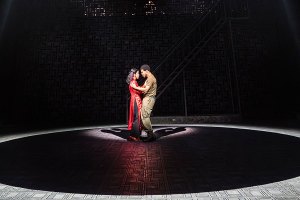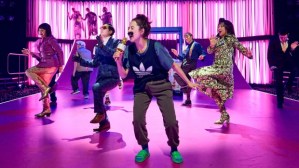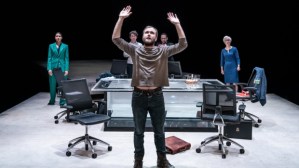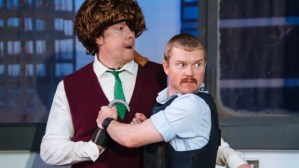We Could All Be Perfect at Sheffield Theatres’ Tanya Moiseiwitsch Playhouse – review
The world premiere of Hannah Morley’s debut play runs until 14 October

We Could All Be Perfect is exhilarating and gloriously varied, but it’s also confusing and moves in and out of focus. Hannah Morley, in her debut stage play, seems to have thrown in everything that preoccupies her and the result is a brave, challenging and vital work that is never afraid to follow the idea wherever it leads.
The play is essentially a celebration of teenage girls, from wild screams to changing the world. Morley herself comments that surprisingly often at the centre of a movement to bring change is a teenage girl – currently Greta Thunberg springs to mind and she is the presiding genius over the suddenly serious last 15 to 20 minutes. It’s worth saying that, for the majority of its 95 interval-less minutes, many of the sketches amuse, if only because of the implicit recognition: Morley’s script, with its overlaps, hesitations and sudden bursts of enthusiasm, produces chuckles, especially from the younger females who recognise themselves in it.
Ruby Clarke’s direction is full of energy and contrast. Ruta Irbite has designed a spectacular set, a white band running between audience on two sides and sweeping up the wall at both ends. The actors play on and around this band, with the aid of minimal props, a set of portable round mirror/cameras the main feature. Jessie Addinall’s lighting and Annie May Fletcher’s sound point the different scenes dramatically.
So what of the actors? Anshula Bain, Heather Forster, Rosa Hesmondhalgh, Alice Walker and Jada-Li Warrican are listed in the programme without character names, rather in the manner of a television sketch show. All are excellent, mostly in shades of pink, playing through a series of sketches that often finish just before the punch-line.
We begin with a teenage girl thinking of empowerment, but the scenes follow thick and fast. Joan of Arc (a teenage girl, of course) is sitting for an artist who thinks her expression of a smile inappropriate. When all is explained to her, a scream seems more apposite at which point the remaining three actors rush screaming across the stage in modern dress. It’s this contrast between teenage idealism and giddiness that Morley exploits so expertly. Her control of tone is well shown in a somewhat longer piece where two girls accost a bully. One recites her offences so entertainingly that the other has to stifle giggles before the mood darkens.
The later stages adopt a more apocalyptic tone, but the final thought is that “we could all be perfect” and the last speech affirms the power of the teenage girl to do anything – of course, but she also adjusts her football kit “because everyone’s looking at me” or demands of a hairdresser to shave off her hair.
Morley happily throws together the girl who dances manically to a pop tune and the one who wants to change the world. They are, in fact, the same.



















